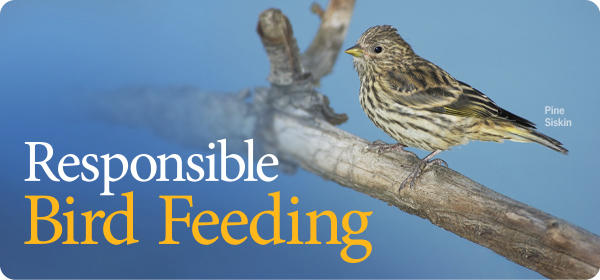Wild Birds Unlimited Recommends Responsible Bird Feeding
If you enjoy feeding and watching your backyard birds, then you probably want to do as much as you can to practice your hobby safely and ensure the birds’ overall health and well-being. Here are some things you can do to help your birds stay healthy.
- Provide multiple feeding stations in different areas of your yard to disperse bird activity.
- Provide seed from a bird feeder rather than scattering it on the ground.
- Keep areas clean under and around your feeders.
- Keep fresh seed in the feeder and be sure it doesn’t get moldy.
- Clean your bird feeders regularly (at least once per season) with a solution of one part bleach and nine parts water.
The following strategies will help improve the health and safety of birds when the spread of avian diseases is a concern.
- If feeder birds are exhibiting disease symptoms, then remove all feeders so birds can disperse and utilize natural food sources.
- Clean and sanitize all bird feeders, bird baths and hardware with a 10% bleach (one part bleach to nine parts water) solution. Rinse thoroughly and allow to completely dry before refilling feeders. Continue to sanitize feeders every week or so.
- Rake up and discard seed debris and bird droppings from the ground below and around feeders. Continue to clean these areas on a regular basis.
- Give the birds more space. If using multiple feeders, place the feeders farther apart from one another. This will reduce crowding and lessen the potential for disease transmission between sick and healthy birds.
- Only use feeders that can be easily cleaned. Replace wooden feeders with ones made of plastic or recycled materials for easier cleaning.
- Bird feeders with cracks and crevices are difficult to sanitize and should not be used.
- Remove open tray and platform feeders that allow fecal material and food to come into contact with each other.
- Use antimicrobial bird feeders such as Wild Birds Unlimited EcoClean® Feeders. These feeders have built-in antimicrobial product protection on the treated surfaces.
- If finch populations are involved:
- Initially reintroduce foods and feeders that will not attract finches (suet, peanuts, hummingbird feeders, etc.)
- Reinstall finch feeders and food after an additional two weeks. - Avoid handling sick birds and always wash your hands with soap and water after filling bird feeders.
Offering healthy food to our feathered friends is good for them, as long as it is done in a responsible manner. Studies have shown increased survival rates of birds with access to feeders during periods of harsh weather conditions. In addition, birds with access to supplemental food also have increased nesting success. So, keep your feeders full and all your backyard habitat components clean. Enjoy your birds and rest assured that you are helping them prosper.


